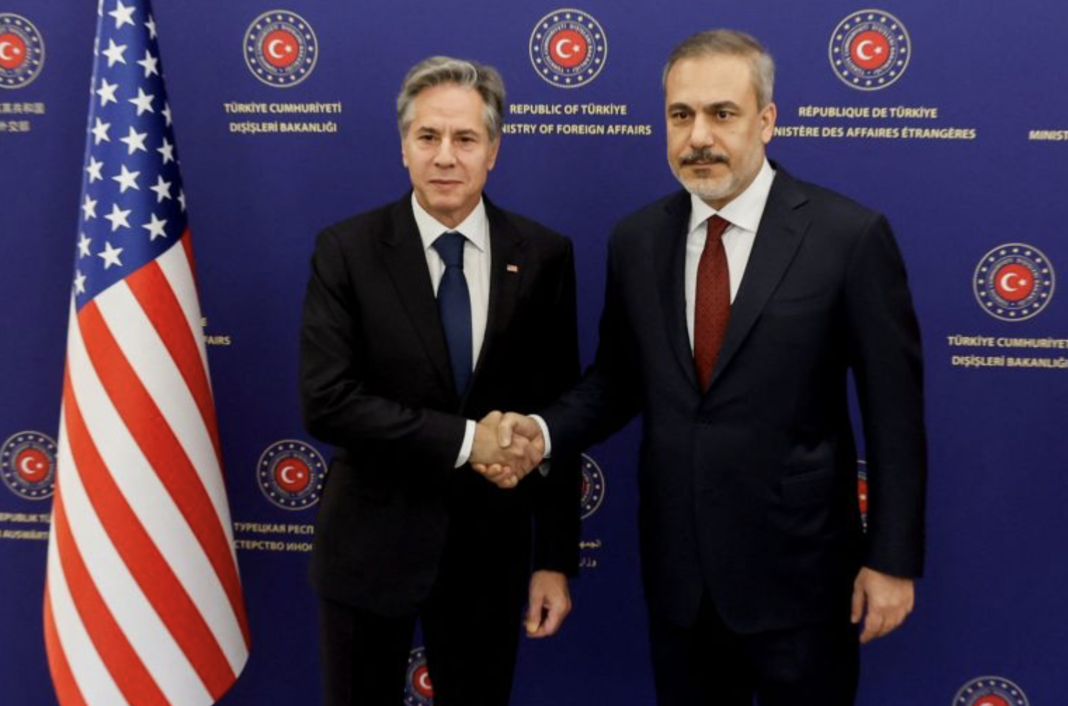His visit to the region was aimed at preventing an escalation of the conflict as Israel refuses to stop its bombardment.
United States Secretary of State Antony Blinken has met his Turkish counterpart as he continued a challenging Middle East tour aimed at easing regional tensions over the Israel-Hamas war.
Blinken met Turkish Foreign Minister Hakan Fidan for two and a half hours on Monday morning in the Turkish capital Ankara, but was snubbed by President Recep Tayyip Erdogan.
“Blinken’s main mission was to buy more time [for Israel],” Tamer Qarmout, professor in public policy at the Doha Institute for Graduate Studies, told Al Jazeera. “And the Turks know this. That’s why he got this cold reception.”
Blinken’s trip to Turkey follows on the heels of strained meetings with Arab leaders in Iraq, Palestine, and Jordan over the weekend.
Arab and Muslim leaders have expressed frustration over Washington’s staunch backing of Israel as it continues its monthlong assault on Gaza, killing more than 10,000 people, more than a third of them children.
Washington has supported the need for a “humanitarian pause” to the fighting, but has stopped short of joining much of the world in calling for a full truce.
“We discussed … efforts to significantly expand the humanitarian assistance to people in need, and efforts to prevent the conflict expanding to other parts of the region and what we can do to set the conditions for a durable, sustainable, lasting peace for Israelis and Palestinians,” Blinken later told reporters at the airport before departing Ankara.
“We are working very aggressively on getting more humanitarian assistance in Gaza. And we have very concrete ways in doing that. And I think we’ll see in the days ahead that assistance can expand in significant ways,” he added.
Blinken’s mission, his second to the region since the war began, has found limited support for his efforts to contain the fallout. Israel has rebuffed the US push for a pause to the fighting, while Arab and Muslim nations have insisted on an immediate ceasefire to ease the soaring casualties in Gaza.
Al Jazeera’s Resul Serdar, reporting from Ankara, suggested that Blinken and Fidan found few points of agreement.
“The US side tried to convince Turkish officials to put more pressure on Hamas and make it release the captives,” he said. “But the Turkish position was very clear on this matter. They said that the prisoner release should be mutual, where Hamas releases captives and Israel releases Palestinian prisoners.”
“Turkey also asked for an unconditional ceasefire and said there should be an international mechanism to observe the ceasefire, which Ankara would be the guarantor for,” Serdar continued. “But we haven’t heard anything about a ceasefire from Blinken. He has been using the phrase ‘humanitarian pause’ and the Turkish side has told him that this is not enough.”
Turkey, which is a strategic US ally despite numerous foreign policy rifts, has been one of the region’s fiercest critics of Israel since the war broke out, accusing Israel of behaving like a “war criminal” and committing a “massacre”.
On Saturday, Ankara recalled its ambassador from Tel Aviv, with Erdogan saying he had “written off” dealing with Israeli Prime Minister Benjamin Netanyahu.
The Turkish leader has delivered equally stinging criticism of Western powers that are backing Israel amid the Gaza bloodshed.
“Those who shed crocodile tears for the civilians killed in the Ukraine-Russia war are now quietly watching the killing of thousands of innocent children,” Erdogan said last month.
Public anger
Turkey’s frustration towards Washington was on clear display during Blinken’s visit.
In an apparent snub, Erdogan ditched Blinken to travel across northeastern Turkey, leaving him to convene with his foreign minister.
Hours before the Blinken’s arrival, hundreds of demonstrators rallied outside an airbase that hosts US troops in southeastern Turkey. Police reportedly broke up the protests with tear gas and water canisters.
“There is huge discontent here,” Al Jazeera’s Serdar said. “The organisers [of the protest] are trying to put a tremendous amount of pressure on US and Turkish governments to stop the war in Gaza.”
Foreign policy rifts
The US’s strained relationship with Turkey precedes the Hamas-Gaza war, with the two nations feuding over foreign policy issues ranging from NATO to Iraq.
Ankara is frustrated by the delay in approval from the US Congress for a $20bn deal for 40 F-16 fighter jets. Washington is waiting for Turkey to ratify Sweden’s bid to join NATO.
“I’m convinced that we’ll see forward movement on that,” Blinken told reporters at the airport, when he was asked whether Turkey has given any assurances that it will back Sweden’s NATO membership.
He said that the US was very encouraged by the fact that Erdogan submitted the ratification protocol to parliament, adding that there was “a shared commitment” by Ankara and Washington to make sure that Sweden joins the alliance. “I would expect that we’ll see that come to fruition,” he said.
Adding to tensions, the US has ramped up sanctions against Turkish entities it claims are helping Russia evade sanctions and import war-related goods.
Turkey is also angered by US backing for Kurdish fighters in Syria who battled ISIL (ISIS) but who Ankara views as a part of the armed group Kurdistan Workers’ Party (PKK), banned by Turkey, the US and the European Union.
Mediating role
As the Gaza war drags out, Erdogan has tried to position Turkey as a broker to stop the violence and move towards an independent Palestinian state.
He has said Ankara is “working behind the scenes” with regional allies to forge a ceasefire and secure an uninterrupted stream of humanitarian aid into Gaza.
“Our priority is to establish a humanitarian ceasefire quickly,” Erdogan said on Friday, adding that Turkey was working on “new mechanisms that will guarantee the security of everyone, regardless of whether they are Muslims, Christians or Jews”.
“Our efforts to lay the groundwork for an international peace conference continue,” he said.

